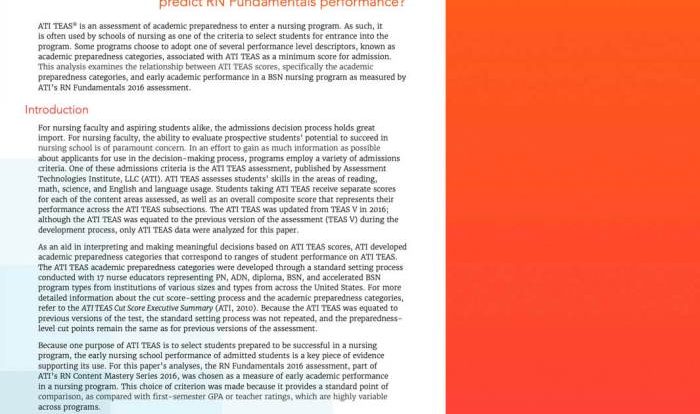Nurse logic testing and remediation advanced test is a critical assessment tool designed to evaluate the cognitive abilities and clinical reasoning skills of nurses. This comprehensive test plays a pivotal role in ensuring the competence and safety of nurses in providing optimal patient care.
This guide provides an in-depth overview of the nurse logic testing and remediation advanced test, including its purpose, structure, preparation strategies, remediation options, and real-world applications. By understanding the intricacies of this assessment, nurses can enhance their critical thinking, clinical decision-making, and overall patient care capabilities.
1. Introduction
Nurse logic testing and remediation advanced test is a comprehensive assessment designed to evaluate the critical thinking, clinical reasoning, and problem-solving abilities of nurses.
This test is targeted towards nurses who are seeking advanced practice roles, such as nurse practitioners or clinical nurse specialists. The objectives of the test are to:
- Identify nurses who possess the necessary cognitive skills for advanced practice.
- Provide a standardized measure of nursing knowledge and competence.
- Facilitate the development of targeted remediation programs for nurses who need additional support.
2. Test Content and Structure

The nurse logic testing and remediation advanced test covers a wide range of nursing content areas, including:
- Advanced nursing practice theories and concepts
- Pathophysiology and pharmacology
- Health assessment and physical examination
- Diagnosis and management of common health conditions
- Patient education and counseling
- Interdisciplinary collaboration
The test consists of a variety of question types, including multiple-choice, true/false, and short answer. The test is typically administered in a computer-based format and has a time limit of 3 hours.
The test is scored based on the number of correct answers. A passing score is typically required for nurses to be eligible for advanced practice roles.
3. Preparation Strategies
To prepare for the nurse logic testing and remediation advanced test, it is important to:
- Review the test content Artikel and identify areas where you need additional study.
- Use a variety of study resources, such as textbooks, online courses, and practice tests.
- Take practice tests to familiarize yourself with the test format and question types.
- Develop a study schedule and stick to it.
- Get enough sleep and exercise.
On the day of the test, it is important to arrive early and be well-rested. You should also bring a calculator and a pen or pencil.
4. Remediation Strategies: Nurse Logic Testing And Remediation Advanced Test

Nurses who do not pass the nurse logic testing and remediation advanced test may be eligible for remediation.
Remediation programs typically involve individualized instruction and support. The goal of remediation is to help nurses improve their cognitive skills and knowledge base so that they can successfully pass the test.
There are a variety of remediation programs available. Some programs are offered by schools of nursing, while others are offered by private companies.
When choosing a remediation program, it is important to consider the following factors:
- The cost of the program
- The length of the program
- The format of the program
- The reputation of the program
Key Questions Answered
What is the purpose of the nurse logic testing and remediation advanced test?
The nurse logic testing and remediation advanced test assesses nurses’ cognitive abilities, critical thinking skills, and clinical reasoning proficiency to ensure their competence in providing safe and effective patient care.
Who is the target audience for the nurse logic testing and remediation advanced test?
The test is primarily intended for registered nurses (RNs) seeking to advance their careers or demonstrate their proficiency in complex nursing practice areas.
How can nurses prepare for the nurse logic testing and remediation advanced test?
Effective preparation involves studying advanced nursing concepts, practicing critical thinking and clinical reasoning skills, and utilizing practice tests and mock exams.
What are the remediation options available for nurses who do not pass the test?
Remediation programs typically involve individualized learning plans, mentorship, and additional coursework to address knowledge gaps and enhance cognitive abilities.
